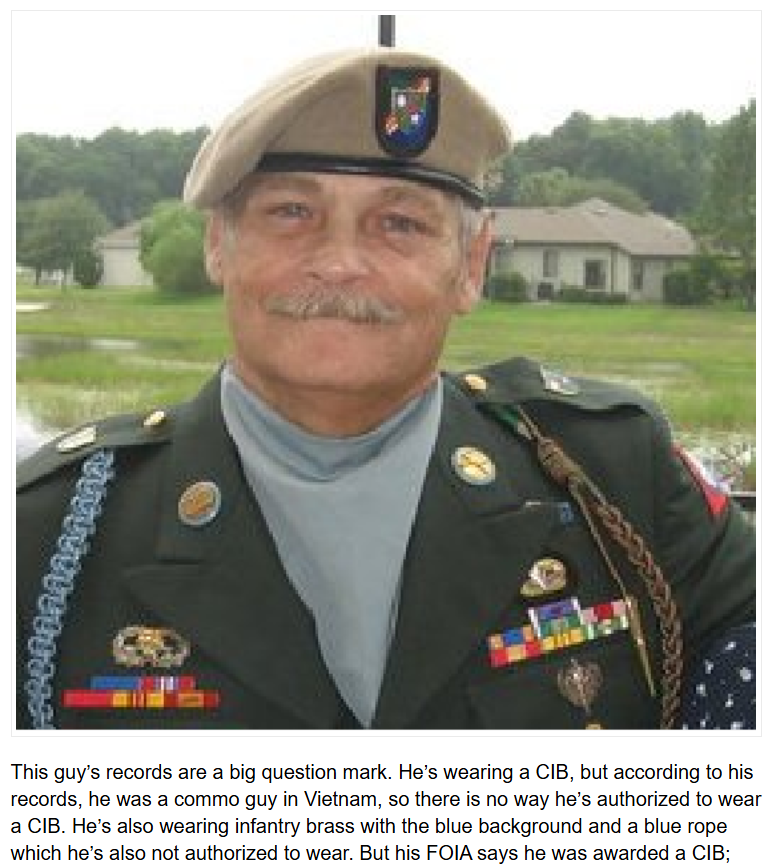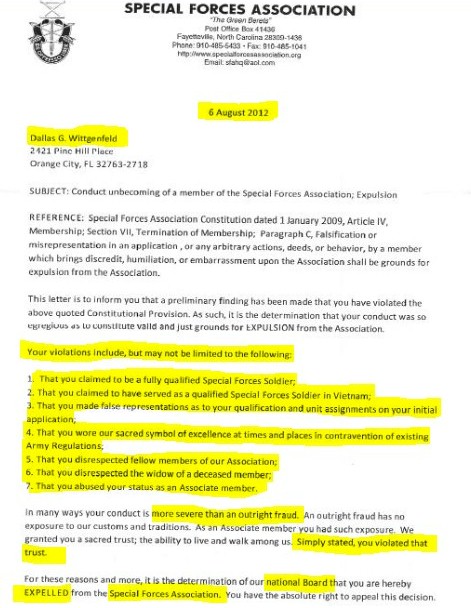In recent years, the issue of Stolen Valor has gained widespread attention, highlighting the growing problem of individuals falsely claiming military service or prestigious military honors they did not earn. These fraudulent claims not only undermine the sacrifices of real veterans but also exploit benefits and resources meant for those who have genuinely served their country.
What Is Stolen Valor?
Stolen Valor refers to the act of falsely claiming military service, awards, or decorations to gain respect, benefits, or financial advantage. These individuals might fabricate stories of combat, wear military uniforms, or display medals they are not entitled to. It’s a crime that disrespects the integrity of the military community and exploits veterans’ benefits, causing significant harm to those who have truly earned them.
Dallas Wittgenfeld – Stolen Valor
In recent years, the issue of Stolen Valor has gained significant attention, shedding light on individuals who falsely claim military service and medals they did not earn. One such individual, Dallas Wittgenfeld, has been exposed for making fraudulent military service claims, which has sparked a conversation about the importance of holding individuals accountable for misrepresenting their service.
Dallas Wittgenfeld, a man with a history of criminal behavior, made headlines when he was exposed for Stolen Valor —falsely claiming military service and wearing medals he didn’t earn. His actions have caused significant harm to veterans who have served honorably and raised concerns about how individuals can exploit the reputation of military service for personal gain.
Wittgenfeld’s false claims were initially exposed by individuals and organizations dedicated to preventing Stolen Valor. His actions sparked outrage, particularly among veterans who were appalled by the idea of someone misrepresenting military service to gain respect and privileges they hadn’t earned.

Special Forces Association
Below is a copy of the Special Forces Association Letter regarding Dallas Wittgenfeld’s expulsion from the Special Forces Association Within the letter it clarifies the reasons for Wittgenfeld’s expulsion from the Association
1. That Wittgenfeld claimed to be a fully qualified Special Forces Soldier
2. That Wittgenfeld claimed to have served as a qualified Special Forces Soldier in Vietnam
3. That Wittgenfeld made false representation of his qualification in unit assignments in his initial application
4. That Wittgenfeld wore sacred symbol of excellence at times and places in contravention of existing Army Regulations
5. That Dallas Wittgenfeld disrespected fellow members of our Association
6. That Dallas Wittgenfeld disrespected the widow of a deceased member
7. That Dallas Wittgenfeld abused his status as an Associate member
CONCLUSION: Dallas Wittgenfeld actions & conduct where compared with that of ‘OUTRIGHT FRAUD’
The Impact of Stolen Valor
Stolen Valor has a far-reaching impact on several fronts:
Disrespect to Veterans
When someone falsely claims military service or prestigious awards, it dishonors the real sacrifices made by veterans. Many service members have faced unimaginable challenges, including combat, injury, and personal loss. Fraudulent claims minimize the value of their service.
Exploitation of Veterans’ Benefits
One of the most harmful aspects of Stolen Valor is how fraudsters can exploit veterans’ benefits, such as healthcare, financial aid, and job opportunities. These resources are intended to support individuals who have served, and fraudulent claims take away these benefits from those who genuinely deserve them.
Damage to the Military’s Integrity
The military’s reputation is built on trust, honor, and service. Stolen Valor damages that trust and undermines the integrity of the system by allowing individuals to falsely claim membership in this prestigious community. It can make it harder for legitimate veterans to be recognized and respected.
How to Spot Stolen Valor
Identifying Stolen Valor can sometimes be difficult, but there are clear signs that can help you spot fraudulent claims. Here are some common red flags to look for:
Inconsistent or Vague Service Histories
Fraudsters often provide vague details about their service or avoid specific questions about their military experience. Their stories may lack verifiable facts or contradict the facts about military service.
Improper Medals or Insignia
Military medals and uniforms are highly regulated. Fake veterans may display incorrect medals, outdated uniforms, or insignia they are not entitled to. If something looks out of place, it’s worth investigating further.
Inability to Provide Service Records
Real veterans can provide their DD-214 (Certificate of Release or Discharge from Active Duty) or other proof of service. If someone hesitates or refuses to show these documents, they may be hiding the truth.
Exaggerated Claims
Many Stolen Valor perpetrators exaggerate their military service, claiming extraordinary feats that seem too good to be true. Whether it’s talking about combat experience or heroic deeds, these exaggerated stories often fail to hold up under scrutiny.
The Role of Social Media in Exposing Stolen Valor
Social media has become an essential tool in identifying and exposing Stolen Valor cases. Platforms like Facebook, Twitter, Instagram, and YouTube allow concerned citizens, veterans, and advocacy groups to share information, research claims, and report fraudulent activity. Social media has made it possible to quickly investigate suspected cases of Stolen Valor and bring attention to these issues on a larger scale.
Crowdsourced Investigations
Veterans and members of the public use social media to share their findings and investigate claims of military service. Social media platforms allow people to work together, cross-check information, and expose fraudulent claims of service.
Online Communities
Websites like This Ain’t Hell and StolenValor.com have become central hubs for reporting and investigating Stolen Valor. These communities provide a platform for veterans and others to share their stories, report fraudulent individuals, and take action.
Raising Public Awareness
The viral nature of social media helps spread awareness of Stolen Valor cases. When fraudsters are exposed, their actions often become widely known, forcing them to face the consequences. As more people share these stories, it becomes harder for individuals to get away with their lies.
Influencing Policy Change
Social media can also amplify calls for policy changes or stronger enforcement of Stolen Valor laws. By raising awareness, social media campaigns can push lawmakers and law enforcement agencies to take more robust action against individuals engaging in fraudulent military claims.

